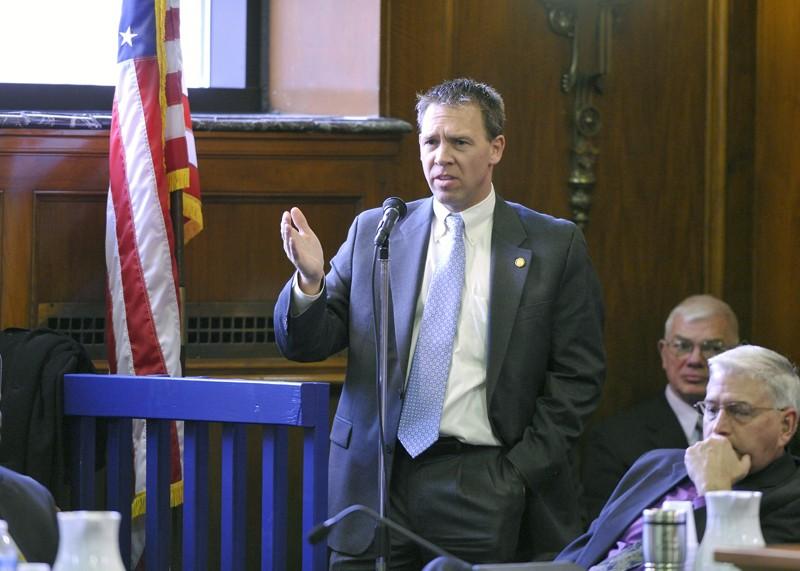Proposed university commission sparks controversy

Courtesy Photo/ gophouse.com State representative Bob Genetski speaks during the governors budget proposal.
Sep 29, 2011
After an average increase in tuition this fall by just under 7 percent at universities throughout Michigan, State Rep. Bob Genetski (R-Saugatuck) is calling for a commission to oversee Michigan’s public universities.
If passed, the proposed 11-member commission would study Michigan’s 15 public universities and the structures in place that determine tuition rates for each institution. The commission would offer recommendations to the governor and the state legislature based on its findings.
“It is a commission that will initiate a dialogue, with the overall idea being that we need to do all we can to protect our students and Michigan families from excessive tuition increases,” Genetski said. “It’s a dialogue that hasn’t been had in a long, long time, or maybe it’s never been had in this manner of the commission.”
Genetski, a GVSU alumnus, said the commission, if created, would have no real power but would look to offer reform concepts in the hope of possibly bringing tuition rates down, the main function of the commission being to initiate discussion about these issues.
GVSU alumna Noreen Myers, chair of the Board of Trustees at GVSU, said she “is a little angry about it.”
“We don’t need a bill to have that discussion,” she said. “My initial reaction, along with the other trustees, I’m quite certain, are that we are rather offended with the implication that we don’t provide sufficient oversight. I just feel at this level we can have much more impact, we have a better understanding and we don’t need more bureaucracy on top of us.”
Serving without compensation, trustees at universities determine whether or not tuition will increase, decrease or remain at the current rate. GVSU trustees are appointed by the governor and approved by the state legislature. Only three institutions — the University of Michigan, Michigan State University and Wayne State University — have trustees appointed through state election.
If Genetski’s bill is passed, one of the main functions of the commission would be to oversee how the trustees operate and make their decisions.
“Again, I go back to it initiating a discussion,” Genetski said. “I don’t think anybody needs to fear, especially universities who believe very much in exploring new theories and new ideas, I don’t think anybody has to fear an open, honest discussion and exchange of ideas within the system.”
Genetski said part of the problem is that although these trustees, including those at GVSU, are doing a fine job, people simply have no idea who they are and how much power they hold.
GVSU officials like President Thomas J. Haas and Matthew McLogan, vice president for university relations, defend their trustees by citing that GVSU was named on the list of America’s 100 Best College Buys for the 16th consecutive year, the only Michigan public university to make the list. President Haas also said GVSU receives well under the state average for appropriations-per-student.
The average per-student appropriations given to universities in Michigan is about $4,500; GVSU receives $2,170 despite dramatic increases in enrollment in recent decades. Compared to the national average of $7,000 per student, Haas said appropriations place GVSU in the bottom 5 percent of American public universities.
“If we here at Grand Valley were just to receive the floor funding level that the state legislature has established, I’d reduce tuition without question,” Haas said. “I’m a guy who does strategic planning. I believe in that, and I believe that form follows function and in this case [Genetski is] looking at the form without identifying what the function and what the outcomes are.”
Genetski said he is willing to accept that part of the reason for tuition increases is because of a drop in state aid; however, the representative did add that while state aid has dropped 31 percent in the past decade, university expenditures have increased around 110 percent.
“It may be that maybe the commission meets for two years and says, ‘You know what? We do have the best system in the nation as far as governance,’” Genetski said. “That may be the case, but it’s a discussion still worth having if as long as kids and families still are struggling to pay their tuition.”





















